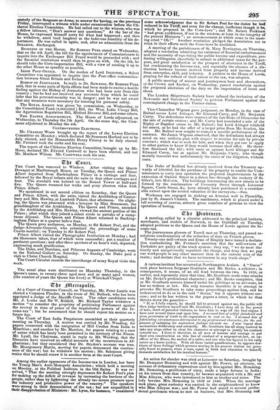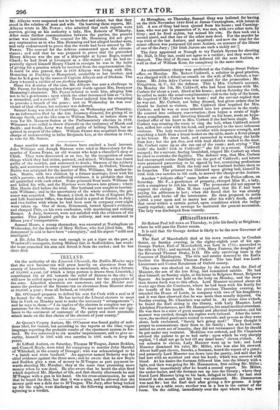'tb e ihobintes.
A meeting, called by a circular addressed to the principal bankers, merchants, and traders of Norwich, in the Guildhall on Tuesday, adopted petitions to the Queen and the House of Lords against the In- come-tax.
The journeyman glovers of Yeovil met on Thursday, and passed re- solutions condemnatory of the reduction of duty on French gloves.
Twenty-one mill-owners and firms of Bingley have issued a declara- tion contradicting Mr. Ferraud's assertion that the mill-owners of Yorkshire are guilty of the truck system : they say, " we do most dis- tinctly and unequivocally repudiate the charge, and deny that we pay our workpeople in any other manner than in the current coin of the realm ; and declare that we have no interest in any truck-shops."
A curious incident has occurred at Northampton Assizes. A "fracas" took place between Sergeant Goulburn and Mr. Becke, a solicitor ; in consequence, it seems, of an old feud between the two. In 1836, or earlier, and repeatedly since that time, Mr. Goulburn made some attacks on Mr. Becke's professional character ; and Mr. Becke complains, that as Mr. Goulburn screens himself under his privilege as an advocate, he has no redress at law. His only resource therefore is to attempt to provoke Mr. Goulburn to take some proceedings against him, and he endeavoured to do so in the said "fracas," but it appears without suc- cess; and so he has written to the papers a letter, in which he thus throws down the gauntlet— "if, as I fully expect, he should fail to proceed against me, the public will then judge between myself and Mr. Goulburn ; I have done all in the power of man, short of personal violence' to force him to wipe off the foul stigma I have now several tunes cast upon him. I accused him of wilful falsehood and gross perversion of truth in the imputations he cast on me. I accused him of fabricating circumstances detrimental to my professional character, for the sole purpose of indulging his malevolent feelings towards me. I now repeat these accusations deliberately and advisedly. Mr. Goulburn has all along omitted to take any steps either to clear his character or attempt to justify his conduct towards me. I leave it therefore to all men of honour and courage to put their own construction on this line of conduct of a sergeant-at-law, an ex- officer of the Blues, the author of a satire, and one who has figured in his early career as a horse-jockey. With all these varied qualifications, he appears des- titute of those feelings which persons moving in his present station are gene- rally found to possess, when a man, equal in birth and education to himself, demands satistion for his insulted honour."
An action for slander was tried at Leicester on Saturday, brought by Mr. Dempster Hemming and wife against Mr. Power, an attorney, on account of defamatory expressions used by him against Mrs. Hemming. Mr. Hemming, a gentleman of sixty, made a large fortune in India: on his return from that country, he became acquainted with a Mr. and Miss Alleyne, who were introduced to him as brother and sister. The lady became Mrs. Hemming in 1839 or 1840. When the marriage took place, great curiosity was excited in the neighbourhood to know who Miss Alleyne was ; and Mr. Power had stated to several. profes- sional gentlemen whom he met on business, that Mrs. Hemmuig and Mr. Alleyne were suspected not to be brother and sister, but that they stood in the relation of man and wife. On learning these reports, Mr. Alleyne wrote to Mr. Power ; who admitted that such reports were current, giving as his authority a lady, Mrs. Roberts of Witherby. After some further communication between the parties, the present action was instituted. The counsel for Mr. Hemming did not give any explanation as to who Mrs. Hemming and her alleged brother were, and only endeavoured to prove that the words had been uttered by Mr. Power. The counsel for the defence commented upon this circum- stance; and said that he was prepared to prove that the pretended Henry Alleyne was the son of a shipwright at Lyme Regis, named Chard ; he had lived at Liverpool as a tide-waiter ; and he had re- peatedly signed himself Henry Chard in receipts he was in the habit of giving for a pension which he received from the superannuation -list. It could be also proved, that in 1838 Alleyne was living with Mrs. Hemming at Finchley or Hampstead, ostensibly as her brother, and that he had gone by the names of Captain Alleyne and of Dinham. The Jury" returned a verdict of one farthing damages.
Since the decision of the case, Mr. Alleyne has sent a challenge to Mr. Power, for having spoken derogatory words against Mrs. Dempster Hemming's character. Mr. Power refused to meet him, alleging him not to be a gentleman ; upon which the other denounced him as "a liar, a scoundrel, and a coward." Mr. Power indicted him for attempting to provoke a breach of the peace ; and on Wednesday he was con- victed of that offence, but sentence was deferred.
Samuel Long was tried at Cambridge, on Wednesday and Thursday, on an information filed by the late Attorney-General, for giving 9/. to George Smith, and the like sum to William Marsh, to induce them to vote for Mr. Manners Sutton at the Parliamentary election in 1839. Witnesses were called to throw discredit on the testimony of Marsh and Smith ; and finally, Long was found guilty of bribing Smith, but ac- quitted in respect of the other. William Swann was acquitted from the charge of endeavouring to bribe Benjamin Lee, at the election in 1841, to vote for Mr. Sutton.
Some murder cases at the Assizes have excited a local interest. John Williams and Joseph Slawson were tried at Shrewsbury for the murder of Emma Evans, an old woman who kept a chandler's shop at Chirk. They were discovered at an inn, by the recognition of some things which they had stolen, pursued, and seized. Williams was found guilty of the murder, and sentenced to death ; Slawson of the robbery only, and sentenced to seven years' transportation. At Oxford, Thomas Harris was arraigned for the murder of Mrs. Williams, his mother-in- law. Harris, with two children by a former marriage, lived with his wife's parents; and, from conflicting evidence, it is probable that they all quarrelled with each other. Some poisoned flour made Williams ill and killed his wife, and the Harrises were thrown into prison ; where Mrs. Harris died before the trial. Her husband now sought to incrimi- nate Williams ; and in the uncertainty of the whole evidence, the pri- soner was acquitted. Mr. Bennet, a clerk in the West of England Fire and Life Insurance Office, was found dead in a pond at Exeter, in July ; and two bullies with whom he had been seen in company over-night were taken up. One of them, Brinsmead, turned Queen's evidence, and charged Pitts, on his own confession, with murdering and robbing Bennet. A Jury, however, were not satisfied with the evidence of the murder. Pitts pleaded guilty to the robbery, and was sentenced to fifteen years' transportation.
Samuel Moore, a young shoemaker, was executed at Nottingham on Wednesday, for the murder of Mary Hallam, who had jilted him. His demeanour is said to have been "exemplary," and his aspect "mild and intelligent."
A Mr. John Martin was rash enough to pat a tiger on the paw, at Wombwell's menagerie, during Midlent fair, in Staffordshire, last week : the beast crunched his arm and forced it from the socket ; and he has since died.



























 Previous page
Previous page